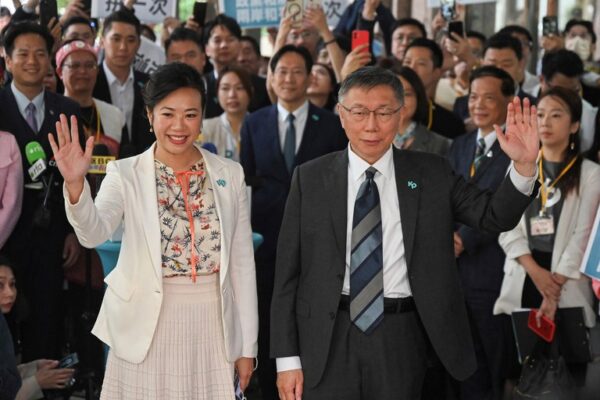Just 10 years after trading his white coat for a place on the mayoral hustings, Taipei Mayor Ko Wen-je, who also heads the four-year-old Taiwan People’s Party, is looking increasingly like a potential challenger to Vice President Lai Ching-te in January’s presidential election. A recent poll of voters by the Taiwanese Public Opinion Foundation showed Ko has an approval rating of 31.9% compared with 29.2% percent for the ruling Democratic Progressive Party’s Lai and 23.6% for nationalist Kuomintang candidate and New Taipei City mayor Hou Yu-ih. Earlier polls had shown a healthy lead for Lai and running mate Hsiao Bi-khim, with Ko trailing in third place after plans for a joint Ko-Hou ticket foundered. The foundation described Ko as “a terrible nightmare that the DPP must not ignore,” adding that Ko’s support is highest among well-heeled white-collar workers, but that he also has similar appeal to Lai among blue-collar voters. Far from boosting the Lai campaign, the recent collapse of talks between Lai and Hou over a possible “blue-white” joint ticket actually appears to have damaged it, boosting Ko’s approval rating by 6.3 percentage points and leaving Lai’s half a percentage point lower, the foundation said. With less than 50 days of campaigning left to go before the Jan. 13 election, the result suggests Ko is a wild card candidate who could sway the result in unpredictable ways, the poll of 755 people with a 3.57 percentage-point margin of error and a 95% confidence level found. “This is likely to be the most unpredictable of all presidential elections so far,” the foundation said. “We won’t know who the winner is until it’s over.” Pithy soundbites Ko, a former emergency room doctor who gave up medicine for politics 10 years ago, has generally sought to position himself as an outsider capable of toppling the traditional parties. Ko Wen-je, chairman of the Taiwan People’s Party and presidential candidate, and his running mate Cynthia Wu wave after registering for the upcoming 2024 elections at the Central Elections Commission in Taipei on Nov. 24, 2023. (Sam Yeh/AFP) He has become known for his salty epithets and pithy soundbites, appealing to a broad cross-section of the island’s 23 million population, particularly younger voters. Yet his critics accuse him of dictatorial leanings, an emperor-complex, a too-relaxed attitude to the threat from China, and of flip-flopping on key elements of his political stance to please whoever happens to be listening at the time. Ko has described the 1992 consensus between Beijing and the former Kuomintang government that sought to preserve Taiwan’s de facto independence while never challenging China’s territorial claim on the island as “basically getting down on their knees and surrendering.” “Failure is the norm – success is the exception,” is another Ko-ism, as is his description of politics as “the search for a lost conscience.” Organ transplant doctor Ko, 64, who has claimed an IQ of 157, has a fondness for medical metaphors on the campaign trail, and once referred to an opponent as “less capable than an amoeba.” Born in Hsinchu, Ko began his working life as an emergency and intensive care physician at National Taiwan University Hospital, studying organ transplants in the United States before setting up a transplant team at his hospital, and significantly improving survival rates with his use of ECMO machines. He quit medicine after an organ was mistakenly transplanted into a patient from an HIV-positive donor, announcing he would run for Taipei mayor in 2014, eventually winning the election with the second highest number of votes ever received. Taipei Mayor Ko Wen-je listens to the media during the Taipei-Shanghai forum in Taipei, Aug. 23, 2016. (Chiang Ying-ying/AP) According to veteran journalist Kang Jen-chun, Ko projects a professional, scientific and rational image, along with pragmatism and a sense of openness and transparency. “A large proportion of Taiwanese are very eager to find something outside of the [traditional] blue and green [camps],” Kang said. “Voters want politicians to take more action – stuff that is closer to their lives.” “Ko Wen-je’s seemingly nonsensical comments and jokey approach have gotten young people’s attention.” Lawmaker Tsai Pi-ru, a nurse at Ko’s hospital who later became his chief of staff in the Taipei municipal government, said: “He doesn’t beat around the bush … and if he says something wrong, he apologizes – the only person in Taiwan politics who does that.” “He apologizes, seeks to do better, and moves on,” she said, adding that Ko also has a reputation for straight-dealing, and for a formidable work ethic that sees him taking the bus to work at city hall, starting his day at 7.30 a.m., before hosting a lunch party every day at noon. He also has a reputation for dismantling bottlenecks in the city’s infrastructure in record time, as well as making off-the-cuff, sometimes shocking comments to journalists as he goes about his day. Kang said this gives him a distinct advantage over Lai and Hou when it comes to the electoral “dog-fights” in Taiwan’s media, although his sharp tongue and whimsical remarks can sometimes get him into trouble. Supporters of Ko Wen-je, who was seeking re-election as Taipei’s mayor, wave their mobile phone torches during a campaign rally in Taipei, Nov. 10, 2018. (Tyrone Siu/Reuters) When taken to task in the past, Ko has referred to himself as “a mortal,” describing his life as “a one-way street with no regrets.” Nonetheless, by the time he fought his next mayoral election in 2018, his approval rating had plummeted from to 40% after three years in office, and he only defeated his opponent Ting Shou-chung by a narrow margin of some 3,000 votes. Bully and schemer? His New People’s Party has been hemorrhaging political support, as his critics accuse him of being a bully and a schemer. “His neutrality is a kind of nihilism that blows with the zeitgeist,” Ed Lin, lead singer of Taiwan rock band Leather Lattice, wrote of Ko in a June 2023 article titled “Three Beautiful Misunderstandings of Ko Wen-je.”…






